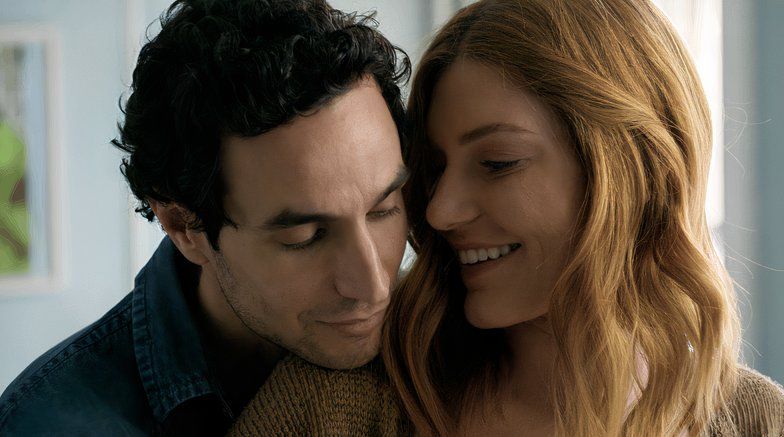
Oday Rasheed’s story captures the common struggle of people living away from their homeland – the desire to embrace a new life while still feeling connected to the place they left. Ali, an Iraqi doctor in New York, tries to distance himself from the turmoil back home, but finds Baghdad is the only place where he truly feels understood and where his family remains.
When it really clicks, Rasheed’s film beautifully captures the feeling of being stuck – that impossible situation immigrants face when life demands they be somewhere else, pulling them away from what truly matters. But honestly, sometimes it gets bogged down in Katie’s rather predictable family issues. I really wish it had focused more on Ali’s story, because that felt incredibly relevant and powerful.
Jess Jacobs finished the screenplay after the original writer, Avram Ludwig, sadly passed away. However, her character’s story isn’t as engaging as it could be. The film struggles to balance the frightening realities of the American immigration process with a less impactful subplot about Katie and her somewhat prejudiced, overbearing father, Ward (Reed Birney). This secondary story feels like it pulls focus from the main narrative instead of adding to it.
Ali and Katie are a couple living together, though they aren’t married. Ali is still working to get his medical license in the US, but that doesn’t stop him from performing life-saving, albeit illegal, surgery on a friend’s daughter’s eye. The experience is deeply upsetting for everyone involved, and Katie suffers from vivid, disturbing nightmares (which the film portrays effectively, though their placement feels awkward). As they prepare to launch a new art exhibit at Katie’s promising gallery, the couple receives good news: Ali’s initial request for political asylum has been approved.
While driving to his girlfriend Katie’s family dinner – a meal with her sister Margot and brother-in-law Charlie – Ali receives urgent, panicked calls from his friend Salam in Baghdad. Salam explains that their friend, Dawod, has been kidnapped during a violent protest and is being held for a $250,000 ransom. Ali, trying to make a good impression on Katie’s father, chooses not to share this distressing news.
Throughout the rest of the movie, Ali desperately tries to raise a huge sum of money, and somewhat inexplicably, keeps it a secret from his colleague. While Reed Birney delivers a standout performance as a strong point in the film, Ward’s character feels out of place. He’s clearly portrayed as a father with outdated liberal views and hidden biases, but his role doesn’t quite connect with the film’s overall message.
The most frustrating part of the story is the unrealistic decision for Ali and Katie to remain unmarried. Margot and Charlie are correct – getting married would solve a lot of problems, and it’s odd they don’t even consider it, despite Ali’s claim that his feelings aren’t based on convenience. Many couples marry to help a partner avoid deportation, so this missing option feels strange. It also doesn’t make sense within the story’s logic. If the goal is to keep Ali’s status uncertain, that’s fine, but recent events show that ICE isn’t hesitant to detain even citizens, so the reluctance to consider marriage feels forced and illogical.
The film moves at a painfully slow pace, which unfortunately drains all the tension the story tries to build. The two main storylines – Ali dealing with immigration while his friend is kidnapped, and his attempts to get along with a prejudiced family – feel disconnected and don’t quite work together. Both stories suffer as a result, and the actor playing Ali doesn’t have the range to fully bring them to life.
The movie doesn’t quite earn its emotional ending because it’s generally too calm and indecisive. It’s difficult to connect with the characters, as their choices often feel either poorly explained or simply self-centered. However, the film does have merit. Its title references the “see something, say something” public safety campaign, hinting at a story that challenges racist fear. But the film actually does the opposite – it subtly undermines that idea. Perhaps the main character, Ali, needs to be more open and express his feelings – for himself, and for the people around him like Dawod and Katie.
Read More
- Brawl Stars December 2025 Brawl Talk: Two New Brawlers, Buffie, Vault, New Skins, Game Modes, and more
- Mobile Legends: Bang Bang (MLBB) Sora Guide: Best Build, Emblem and Gameplay Tips
- Clash Royale Best Boss Bandit Champion decks
- Best Hero Card Decks in Clash Royale
- Call of Duty Mobile: DMZ Recon Guide: Overview, How to Play, Progression, and more
- Clash Royale December 2025: Events, Challenges, Tournaments, and Rewards
- Best Arena 9 Decks in Clast Royale
- Clash Royale Best Arena 14 Decks
- Clash Royale Witch Evolution best decks guide
- Brawl Stars December 2025 Brawl Talk: Two New Brawlers, Buffie, Vault, New Skins, Game Modes, and more
2025-11-02 20:40